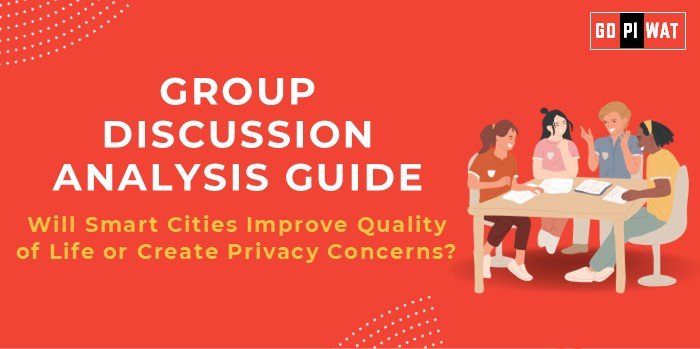📋 Group Discussion (GD) Analysis Guide
🌐 Topic: Will Smart Cities Improve Quality of Life or Create Privacy Concerns?
🌟 Introduction
Smart cities aim to transform urban living by integrating advanced technologies like IoT and AI. While these initiatives promise enhanced quality of life, they raise critical questions about data privacy and cybersecurity.
📊 Quick Facts & Key Statistics
- Global Smart Cities Market: Valued at $748.7 billion in 2023, projected to grow at a CAGR of 25.8% to reach $3,728.3 billion by 2030.
- Smart Cities Mission (India): Launched in 2015 to modernize 100 cities with a total investment of ₹2.05 lakh crore.
- IoT Devices: Over 15 billion interconnected devices globally in 2023, facilitating urban management but also introducing significant security vulnerabilities.
- Privacy Breaches: Unauthorized access to smart city surveillance networks and IoT systems has exposed sensitive information, raising concerns about data misuse.
👥 Stakeholders and Their Roles
- Government: Policy formulation, funding, and implementing privacy safeguards.
- Private Sector: Provides technical expertise and data management services.
- Citizens: Primary beneficiaries, yet at risk of data exposure.
- Global Organizations: Offer frameworks for ethical and sustainable urbanization.
🎯 Achievements and Challenges
🏆 Achievements:
- Energy Efficiency: Smart grids in Barcelona save €42 million annually.
- Traffic Management: AI in Singapore reduced congestion by 15%.
- E-governance: Cities like Surat, India, use smart systems for real-time service delivery.
⚠️ Challenges:
- Privacy Infringements: IoT-based surveillance has led to unauthorized data access.
- Digital Divide: Unequal access to technology exacerbates urban-rural inequalities.
- Cybersecurity Risks: Proliferation of IoT devices introduces vulnerabilities to hacking and data leaks.
🛠️ Effective Discussion Approaches
- Opening Approaches:
- Begin with the global market projection to contextualize the economic impact.
- Use a case study (e.g., unauthorized surveillance access) to highlight privacy concerns.
- Counter-Argument Handling:
- Acknowledge privacy issues but suggest potential safeguards like encryption and robust policy frameworks.
📈 Strategic Analysis of Strengths & Weaknesses
- Strengths: Sustainability, improved urban management, and economic growth.
- Weaknesses: Privacy risks, high implementation costs, and cyber threats.
- Opportunities: Global smart city market growth and innovative urban solutions.
- Threats: Potential misuse of personal data and increasing digital disparities.
📚 Structured Arguments for Discussion
- Supporting Stance: “Smart cities can enhance quality of life by improving efficiency, sustainability, and governance.”
- Opposing Stance: “Mass data collection in smart cities increases the risk of privacy breaches and surveillance overreach.”
- Balanced Perspective: “Smart cities are a step forward, but robust data protection measures are essential to mitigate privacy concerns.”
📘 Connecting with B-School Applications
- Real-World Applications: Case studies on urban planning, data management, and technology innovation.
- Sample Questions:
- “What strategies can be employed to address privacy concerns in smart cities?”
- “How can smart cities bridge the urban-rural divide?”
- Insights for Students: Emphasize ethical data use, cybersecurity innovations, and inclusive development.


